Unit6知识点梳理-牛津上海版英语六年级下册
上海沪教牛津版英语六年级下册Unit 6 PE lessons
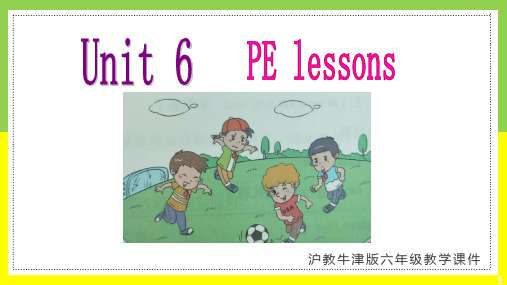
long race 长跑
short race 短跑
……………………………………………………………………………………………………………………………………………………………………
66
……………………………………………………………………………………… ………………………………………………………………………………………
……………………………………………………………………………………… ………………………………………………………………………………………
……………………………………………………………………………………………………………………………………………………………………
………………………………………………………………………………………………………沪……教……牛…津……版……六……年……级……教……学……课…件……… 1
8
……………………………………………………………………………………… ………………………………………………………………………………………
……………………………………………………………………………………………………………………………………………………………………
知识轻松 易 解
We do the long jump and the high jump.本句中的do为实义动词,意为“做”;do还可以做助 动词,我们一起来看看不一样的do究竟区别在哪里吧。
课文开心 易 学
Sometimes we play ball games. I like playing football, volleyball and basketball. 有时候我们玩球类游戏。我喜欢踢足球、打排球和打篮球。 My friends and I like playing sport. We have a lot of fun together. 我的朋友们和我喜欢做运动。我们在一起玩得很开心。
牛津英语上海版六年级下册知识点整理36435
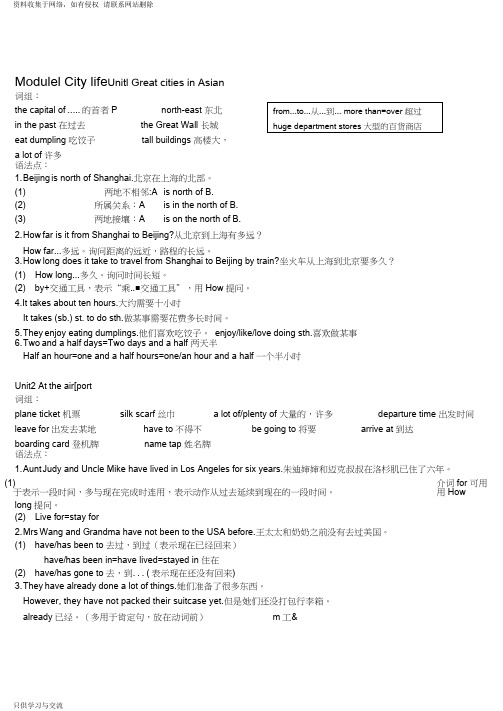
Modulel City life Unitl Great cities in Asian词组:the capital of ..... 的首者P north-east 东北 in the past 在过去 the Great Wall 长城 eat dumpling 吃饺子tall buildings 高楼大,a lot of 许多 语法点:1. Beijing is north of Shanghai.北京在上海的北部。
(1) 两地不相邻:A is north of B. (2) 所属关系:A is in the north of B. (3)两地接壤:Ais on the north of B.2. How far is it from Shanghai to Beijing?从北京到上海有多远?How far...多远。
询问距离的远近,路程的长远。
3. How long does it take to travel from Shanghai to Beijing by train?坐火车从上海到北京要多久? (1) How long...多久。
询问时间长短。
(2) by+交通工具,表示“乘..■交通工具”,用How 提问。
4.It takes about ten hours.大约需要十小时It takes (sb.) st. to do sth.做某事需要花费多长时间。
5. They enjoy eating dumplings.他们喜欢吃饺子。
enjoy/like/love doing sth.喜欢做某事6. Two and a half days=Two days and a half 两天半Half an hour=one and a half hours=one/an hour and a half 一个半小时 Unit2 At the air[port 词组:plane ticket 机票 silk scarf 丝巾a lot of/plenty of 大量的,许多departure time 出发时间 leave for 出发去某地 have to 不得不 be going to 将要arrive at 到达boarding card 登机牌 name tap 姓名牌语法点:1. Aunt Judy and Uncle Mike have lived in Los Angeles for six years.朱迪婶婶和迈克叔叔在洛杉肌已住了六年。
最新牛津上海版英语六年级下册全册复习资料
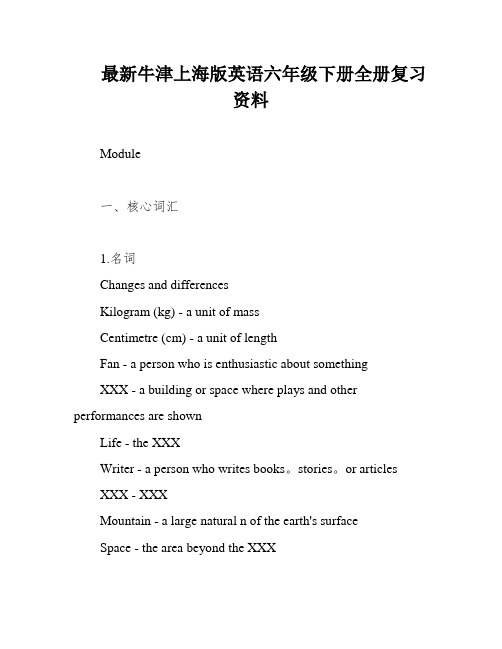
最新牛津上海版英语六年级下册全册复习资料Module一、核心词汇1.名词Changes and differencesKilogram (kg) - a unit of massCentimetre (cm) - a unit of lengthFan - a person who is enthusiastic about somethingXXX - a building or space where plays and other performances are shownLife - the XXXWriter - a person who writes books。
stories。
or articlesXXX - XXXMountain - a large natural n of the earth's surfaceSpace - the area beyond the XXX2.动词Weigh - to determine the weight of somethingDrive - to operate a XXXCarry - to hold or support something while moving3.其他Poor - XXXEven - used to XXX4.短语Street cleaner - a person who cleans the streets二、拓展词汇1.名词Photographer - a person who takes photographsFilm - a XXX flexible strip coated with light-sensitive XXX Broom - a long-XXX sweepingWife - a married womanFairy - XXXPS - postscript。
a note added to the end of a letter after the signatureDinosaur - XXX years ago2.动词Sweep - to clean a surface using a broom3.形容词- extremely goodDigital - XXX4.副词Online - connected to the。
上海牛津英语六年级第二学期知识点汇总
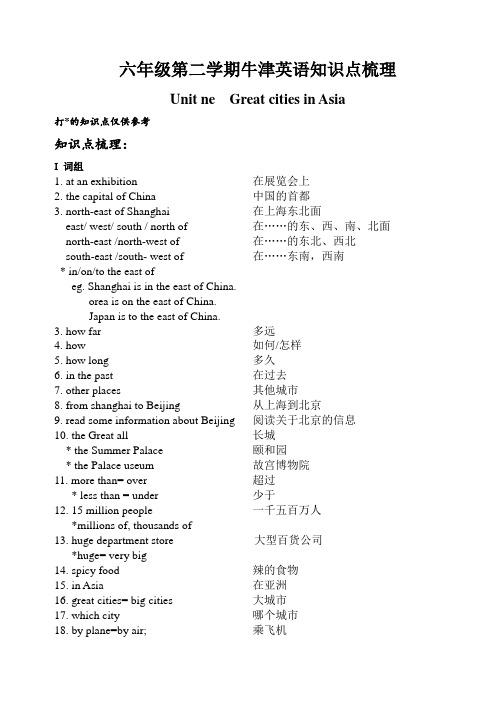
六年级第二学期牛津英语知识点梳理Unit ne Great cities in Asia打*的知识点仅供参考知识点梳理:I 词组1. at an exhibition 在展览会上2. the capital of China 中国的首都3. north-east of Shanghai 在上海东北面east/ west/ south / north of 在……的东、西、南、北面north-east /north-west of 在……的东北、西北south-east /south- west of 在……东南,西南* in/on/to the east ofeg. Shanghai is in the east of China.orea is on the east of China.Japan is to the east of China.3. how far 多远4. how 如何/怎样5. how long 多久6. in the past 在过去7. other places 其他城市8. from shanghai to Beijing 从上海到北京9. read some information about Beijing 阅读关于北京的信息10. the Great all 长城* the Summer Palace 颐和园* the Palace useum 故宫博物院11. more than= over 超过* less than = under 少于12. 15 million people 一千五百万人*millions of, thousands of13. huge department store 大型百货公司*huge= very big14. spicy food 辣的食物15. in Asia 在亚洲16. great cities= big cities 大城市17. which city 哪个城市18. by plane=by air; 乘飞机by ship=by sea; 乘船by train/ ferry 乘火车/ 渡轮19. That’s right. 对的。
Unit 6 第2课时 课文讲解及句型拓展-六年级英语下册(牛津上海版)
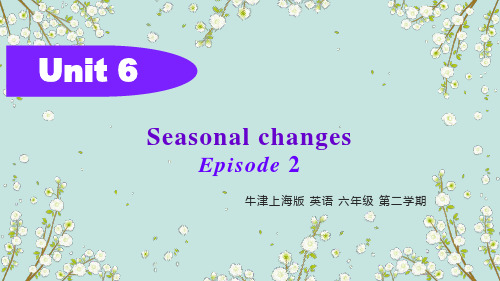
All students must wear red scarves.
Draw and write
C
With your classmates, draw your winter uniforms and write about them.
C
Look and write
Miss Wang is writing a notice about the summer and winter uniforms for all new students in Happy School. Look at the pictures carefully and help her finish the notice.
1
2
3
3-1
shirt
blouse
C
1
2
3
3-2
a pair of shorts
a pair of trousers
C
1
2
3
3-3
a dress
牛津英语上海版六年级(下册)知识点整理
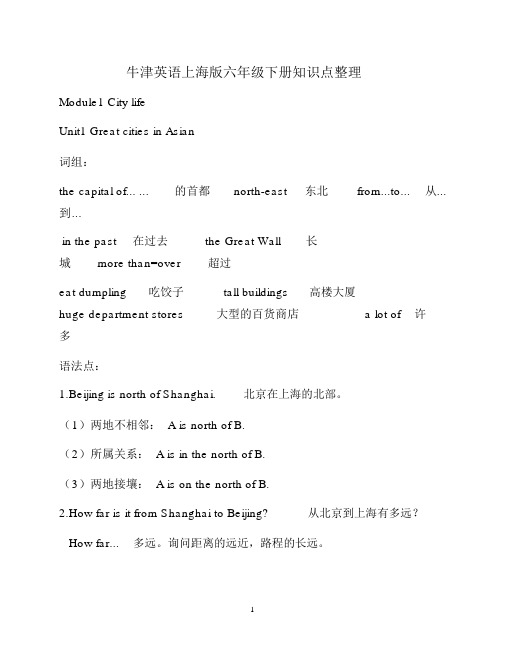
牛津英语上海版六年级下册知识点整理Module1 City lifeUnit1 Great cities in Asian词组:the capital of... ...的首都north-east东北from...to...从...到...in the past在过去the Great Wall长城more than=over超过eat dumpling吃饺子tall buildings高楼大厦huge department stores大型的百货商店 a lot of许多语法点:1.Beijing is north of Shanghai.北京在上海的北部。
(1)两地不相邻: A is north of B.(2)所属关系: A is in the north of B.(3)两地接壤: A is on the north of B.2.How far is it from Shanghai to Beijing?从北京到上海有多远?How far...多远。
询问距离的远近,路程的长远。
3.How long does it take to travel from Shanghai to Beijing bytrain? 坐火车从上海到北京要多久?(1) How long... 多久。
询问时间长短。
How long ⋯多长。
用于询物的问长度。
(2) by+ 交通工具,表示“乘 ...交通工具”,用 How 提问。
4.It takes about ten hours.大约需要十小时It takes (sb.) st. to do sth.做某事需要花费多长时间。
5.They enjoy eating dumplings.他们喜欢吃饺子enjoy/like/love doing sth.喜欢做某事6.Two and a half days=Two days and a half两天半Half an hour=one and a half hours=one/an hour and a half一个半小时Unit2 At the airport词组:plane ticket机票silk scarf丝巾 a lot of/plenty of大量的,许多departure time出发时间leave for出发去某地have to不得不be going to将要arrive at到达boarding card登机牌name tap姓名语法点:1.Aunt Judy and Uncle Mike have lived in Los Angeles forsix years. 朱迪婶婶和迈克叔叔在洛杉矶已住了六年。
2020-2021学年牛津上海版六年级下册英语unit6 语言点和同步默写(无答案)
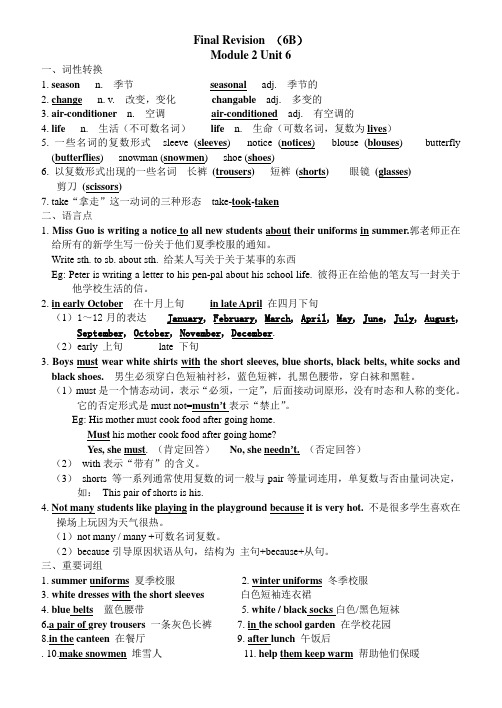
Final Revision (6B)Module 2 Unit 6一、词性转换1. season n. 季节seasonal adj. 季节的2. change n. v. 改变,变化changable adj. 多变的3. air-conditioner n. 空调air-conditioned adj. 有空调的4. life n. 生活(不可数名词)life n. 生命(可数名词,复数为lives)5. 一些名词的复数形式sleeve (sleeves) notice (notices) blouse (blouses) butterfly (butterflies) snowman (snowmen) shoe (shoes)6. 以复数形式出现的一些名词长裤(trousers)短裤(shorts) 眼镜(glasses)剪刀(scissors)7. take“拿走”这一动词的三种形态take-took-taken二、语言点1. Miss Guo is writing a notice to all new students about their uniforms in summer.郭老师正在给所有的新学生写一份关于他们夏季校服的通知。
Write sth. to sb. about sth. 给某人写关于关于某事的东西Eg: Peter is writing a letter to his pen-pal about his school life. 彼得正在给他的笔友写一封关于他学校生活的信。
2. in early October 在十月上旬in late April 在四月下旬(1)1~12月的表达 January, February, March, April, May, June, July, August, September, October, November, December.(2)early 上旬late 下旬3. Boys must wear white shirts with the short sleeves, blue shorts, black belts, white socks and black shoes. 男生必须穿白色短袖衬衫,蓝色短裤,扎黑色腰带,穿白袜和黑鞋。
牛津英语六年下册第六单元知识点归纳与整理
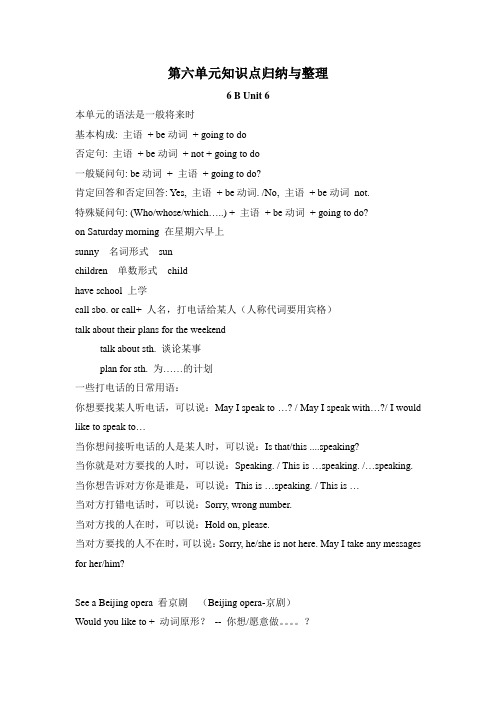
第六单元知识点归纳与整理6 B Unit 6本单元的语法是一般将来时基本构成: 主语+ be动词+ going to do否定句: 主语+ be动词+ not + going to do一般疑问句: be动词+ 主语+ going to do?肯定回答和否定回答: Yes, 主语+ be动词. /No, 主语+ be动词not.特殊疑问句: (Who/whose/which…..) + 主语+ be动词+ going to do?on Saturday morning 在星期六早上sunny 名词形式sunchildren 单数形式childhave school 上学call sbo. or call+ 人名,打电话给某人(人称代词要用宾格)talk about their plans for the weekendtalk about sth. 谈论某事plan for sth. 为……的计划一些打电话的日常用语:你想要找某人听电话,可以说:May I speak to …? / May I speak with…?/ I would like to speak to…当你想问接听电话的人是某人时,可以说:Is that/this ....speaking?当你就是对方要找的人时,可以说:Speaking. / This is …speaking. /…speaking. 当你想告诉对方你是谁是,可以说:This is …speaking. / This is …当对方打错电话时,可以说:Sorry, wrong number.当对方找的人在时,可以说:Hold on, please.当对方要找的人不在时,可以说:Sorry, he/she is not here. May I take any messages for her/him?See a Beijing opera 看京剧(Beijing opera-京剧)Would you like to + 动词原形?-- 你想/愿意做。
沪教版六年级英语下册(上海牛津6B)知识点总结
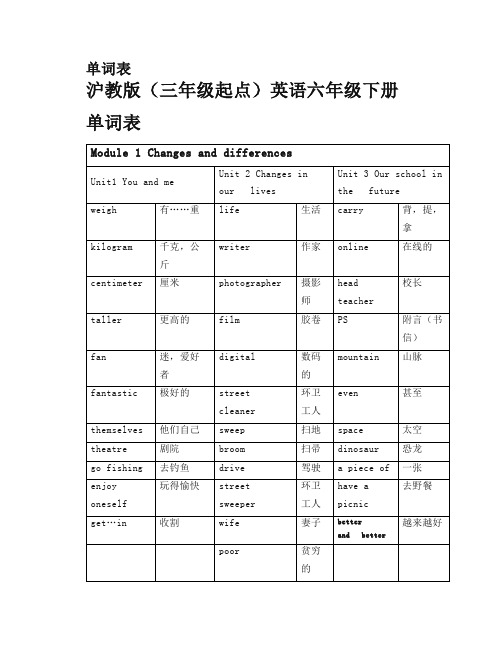
lazy
懒惰的
take off
脱掉
roof
屋顶
yard
院子
hit
碰撞
see the world
见世面
one by one
一个接一个地
look out of
往外看
even
甚至
themselves
他们自己
sweep
扫地
space
太空
theatre
剧院
broom
扫帚
dinosaur
恐龙
go fishing
去钓鱼
drive
驾驶
a piece of
一张
enjoy oneself
玩得愉快
street sweeper
环卫工人
have a picnic
去野餐
get…in
收割
油
craft
手艺,工艺
long race
长跑
oil painting
油画
crown
王冠
short race
短跑
powerful
强有力的
scissors
剪刀
win
获胜
ink
墨水
tape
胶带
long jump
跳远
brush
画笔,刷子
glue
胶水
high jump
跳高
paints
绘画颜料
saw
锯
swimsuit
kilogram
千克,公斤
writer
作家
online
在线的
centimeter
厘米
photographer
上海版牛津英语六年级下册6B重点知识点复习整理

上海版牛津英语六年级下册6B 重点知识点复习整理Module 1 City LifeUnit 1 Great cities in Asia【知识点梳理】1.方位词: east / west / north / south / north-east / north-west / south-east / south-west用法: a. 两地不相邻 : e.g. A is north B.(=to the south of)b.两地接壤 : e.g. A is on the north of B.c.所属关系, A 包含 B, B 属于 A: e.g. B is in the north of A.2.by + 交通工具表示“乘 ,, 交通工具” , 用 how 进行提问e.g. by bus / ferry / train / ship / underground by plane = by air,⋯by ship = by sea3.How far ⋯多远(询问距离的远近,路程的长短)e.g. Hoe far is it from your home to school? 从你家到学校有多远?4.How long ⋯多长,多久(询问时间的长短,提问一段时间)e.g. How long does it take to travel from Shanghai to Beijing by train?坐火车从上海到北京要花多长时间?5. It takes (sb.) some time to do sth.做某事需要花费多少时间e.g. It takes me five hours to make this modal plane.做这个模型飞机花了我 5 个小时。
6.like / love / enjoy doing sth. 喜欢做某事e.g. The people in Bangkok like / love / enjoy eating spicy food. 曼谷人喜欢吃辛辣食物。
上海牛津沪教版六年级(下)同步讲义Unit6
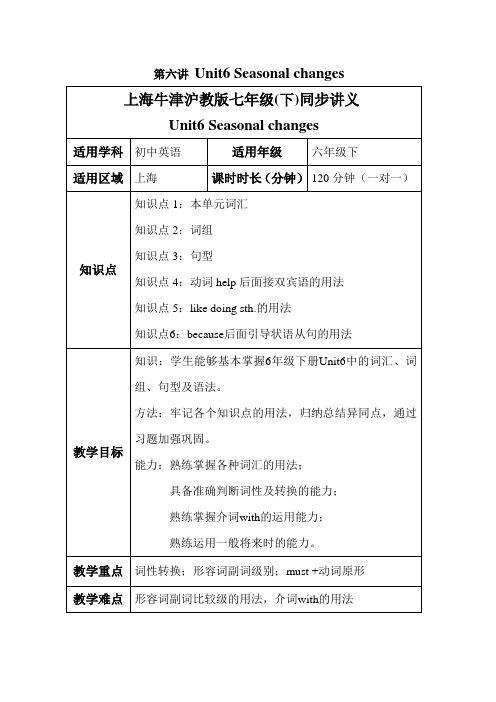
第六讲Unit6 Seasonal changes教学过程一、课堂导入教师讲述一个与本节课题目有关的英文小故事,引出今日所要讲解的知识点,然后让学生简单梳理一下所涉及的问题,带着问题学习本节课的内容。
二、复习预习教师引导学生复习上节课学的重点内容,检测单词的用法,(以提问、回顾的形式进行),针对上节课的作业进行讲评、订正、答疑,并通过英文小故事导入本节课所要学习的新知识。
三、知识讲解1. 知识点一:重点单词1)seasonal [ 'si:zənl]【词性】adj.【词义】季节性的【易混淆点】season n.季节【经典例句】Seasonal changes.季节变化。
2)change [tʃeindʒ]【词性】v.【词义】改变,变化【易混淆点】changeable adj.可变的,多变的【经典例句】You should change your mind.你应该改变你想法。
3)shorts [ʃɔ:ts]【词性】n.【词义】短裤【易混淆点】short adj.短的,矮的【经典例句】Boys must wear white shirts with the short sleeves, blue shorts, black belts, white socks and black shoes.男生必须穿短袖的白衬衫,蓝色的短裤,黑色的腰带,白色短袜和黑色皮鞋。
4)notice [ 'nəutis]【词性1】v.【词义1】注意到【词性2】n.【词义2】告示【经典例句】Miss Guo is writing a notice to all new students about their uniforms in winter.郭小姐正在写一个给所有学生关于他们冬天的校服的告示。
5)belt [belt]【词义】腰带【经典例句】Girls must wear white dresses with the short sleeves, blue belts, white socks and black shoes.女孩们必须穿短袖的连衣裙蓝色腰带,白色短袜和黑色的皮鞋。
Unit6知识点牛津上海版(试用本)六年级英语下册
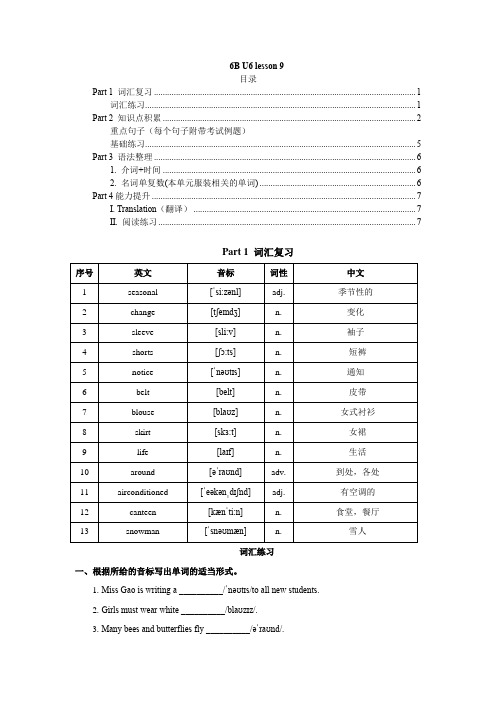
6B U6 lesson 9目录Part 1 词汇复习 (1)词汇练习 (1)Part 2 知识点积累 (2)重点句子(每个句子附带考试例题)基础练习 (5)Part 3 语法整理 (6)1. 介词+时间 (6)2. 名词单复数(本单元服装相关的单词) (6)Part 4能力提升 (7)I. Translation(翻译) (7)II. 阅读练习 (7)Part 1 词汇复习词汇练习一、根据所给的音标写出单词的适当形式。
1.Miss Gao is writing a __________/ˈnəʊtɪs/to all new students.2.Girls must wear white __________/blaʊzɪz/.3.Many bees and butterflies fly __________/əˈraʊnd/.4.There are sone students having ice cream in the __________/kænˈti:n/.二、用所给单词的适当形式填空。
1.There are a lot of ________ jobs in our city. (season)2.He had some ___________ after all these years. (change)3.Boy students must wear shirts with short ________. (sleeve)4.I like this pair of ________. (short)5.Boys must wear blue pants and black ________. (belt)6.All the staff rooms in our school are ________. (airconditioner)st year there was a heavy snow in Shanghai. Many children made ________ in the garden. (snowman)8.We can see a lot of people ________ in the sea in Qingdao. (swim)Part 2 知识点积累1.seasonal changes例:(1)There are a lot of ________ jobs in our city. (season)(2)He had some ___________ after all these years. (change)2.uniforms for different seasons.例:(1)We must wear school __________ (uniform) in summer.(2)There are different food in different __________(country).(3)We have different uniforms ______ different seasons.A.ofB. toC. atD. for(4)They are rwins, but they are different ________ each other.A.ofB. toC. atD. for3.Miss Gao is writing a notice to all new students about their uniforms in summer.例:(1)There is a __________/ˈnəʊtɪs/ on the board.(2)I notice a boy _______ in the playground.A.playB. playsC. to playD. playing(3)I notice a boy ________ by the entrance.A.passB. passesC. passedD. to pass(4)_______ winter, we can make snowmen.A.inB. onC. atD. to(5)I like ______ best because I can swim with my friends.A. springB. summer C autumn D. winter4.All students must wear summer uniforms in September, early October, late April, May and June.wear & put on的区别:(1) wear表示穿着、戴着(衣帽等)的状态She is wearing a silk dress.(2) put on表示穿、戴(衣帽等)的动作“Sam, it’s raining outside. Put on your raincoat!”例:(1)Peter ________ his coat and went out.(2)Mary ________ her new jacket these days.5.in+月份in early October在十月初in late April在四月末例:We have our summer holidays ______ July and August.A.inB. onC. atD. to6.Boys must wear white shirts with the short sleeves.7.Girls must wear white dresses with the short sleeves.例:(1)Everybody must _________ the window when he is the last one to leave the classroom.A.closesB. closeC. closingD. closed(2)As a student, we must ________ hard.A.studiedB. studiesC. to studyD. study(3)I would like to buy a flat(公寓) ________ two bedrooms.A.haveB. hasC. withD. of8.Peter and Kitty have taken some photogrphs of their school life in summer.例:(1)We _________ English for almost three years.A)had studied B) study C) studied D) have studied(2)He ________ here since he was born.A)lived B) live C) has lived D) have lived(3)I have never _______to Beijing before.A)gone B) been C) went D) will go(4)The foreign coaches have ______ China for a few weeks.A)begun to live in B) e toC) been to D) been in(5)She’s been an architect for 10 years. (变为否定句)She _________ _________ an architect for 10 years.(6)We have already finished our tasks.(变为一般疑问句)________ you finished your tasks ________?9.Many flowers grow in the garden.例:How many ________ did you buy for your mother?kB. breadC. orangeD. flowers10.Many bees and butterflies fly around.例:(1)We can see many ________ (bee) in the garden.(2)There are some ____________(butterfly) in the garden.11.Not many students like playing in the playground because it is very hot.例:(1)Do you like ______ in the garden?A.fishingB. fishC. fishesD. to fishing(2)Chirlden are playing ______ the playground.A.ofB. forC. toD. in(3)Linda like winter best, ________ she can make snomen in winter.A.orB. ifC. becauseD. but12.Many students like studying in the library. It is airconditioned.例:It’s very hot outside, but my bedroom is quite cool because it’s ______.A.air pollutionB. air conditionC. air conditionerD. airconditioned13.Many students like having ice cream and soft drinks after lunch.例:(1)Let’s _______ some ice cream and soft drinks.A.eatB. drinkC. haveD. has(2)Many children likes soft _______(drink).(3)We can’t eat too much _________.A.sweetsB. ice creamC. biscuitsD. watermelons14.There are not many leaves on the trees.例:(1)There are not many ______ on that tree.A.leaveB. leafC. leavesD. leafs(2)There ________ a lot of information about study on the Internet.A.isB. haveC. areD. has(3)There _______some flowers in the garden.A.isB. haveC. areD. has15.It helps them keep warm.例:(1)We should help our parents _______some housework.A.doB. doingC. doesD. to do(2)He helped me _______ the classroom yesterday.A.cleanB. cleaningC. cleansD. to clean(3)We must keep ______ in the reading room.A.quietB. quietlyC. noisyD. noisily16.Many students are making snomem.(1)Many students likes making ___________(snowman).(2)We can __________ a snowman in winter.A.do C. makes C. does D. make基础练习I. Choose the best answer.()1. It’s time for lunch.Let’s go to the ______ together.A. gardenB. playgroundC. libraryD. canteen ()2. Christmas is on December 25th. It is in ______ December.A. earlyB. lateC. beforeD. after ()3. It’s very cold. Not____ people swim in the river, but ___ people enjoy the sunshine.A. many, a lotB. many, moreC. more, a lotD. more, more ()4. We all wear summer uniforms ______ September. (★)A. onB. inC. atD. of()5. Tom likes white shirts _______ the short sleeves. (★)A. inB. ofC. onD. with ()6. Many students don’t like playing in the playground ______ it is hot.A. asB. forC. becauseD. before ()7. I was born ______ June 1st, and my mother was also born ______ June.A. in, inB. on, inC. in, onD. on, on ()8. What can you ______ in the garden?A. watchB. see C look D. notice ()9. Put on your jacket, David. It can help you ______.A. keep warmB. keep quietC. keep cleanD. keep fit ()10. All students must ________ school uniforms at school.A. wearB. wearsC. wearingD. wore V. Rewrite the following sentences as required1. She wears a white dress with shorts sleeves. (改为一般疑问句)________ she ________ a white dress with short sleeves?2. Boys must wear black belts. (改为否定句)Boys ________ ________ black belts.3. The kindergarten is in Block 3. (对划线部分提问)________ ________ the kindergarten?4. Children like having ice cream. (对划线部分提问)________ ________ children like?5. Kitty is tall, Cathy is taller. (保持句意不变)Cathy is ________ ________ Kitty.Part 3 语法整理1. 介词+时间在早晨:______ the morning 一个夏天的早晨:______ a summer morning 在下午:______ the afternoon 在星期天下午:______ Sunday afternoon在晚上:______ the evening 在7月2日晚上:______ the evening of July 2练习:1.We always go swimming ______ five o'clock.2.We always go swimming ______ summer.3.We always go swimming ______ Sundays.4.We always go swimming ______ July.5.We always go swimming ______ noon.2. 名词单复数(本单元)可数名词单数变复数规则:(1)一般情况直接+s。
沪教牛津版六年级下册单元知识点一览表
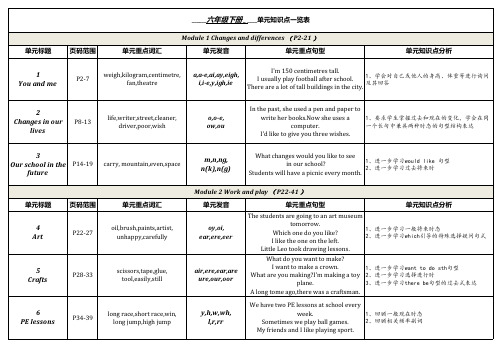
7 Helping others
P42-47
bell,neck,ago,gatekeeper,prais e,praise…for…
Syllables
I can't find my dog. I saw her half an hour ago. I'm going to ask the gatekeeper.
1、进一步学习want to do sth句型 2、进一步学习选择进行时 3、进一步学习there be句型的过去式表达
A long tome ago,there was a craftsman.
y,h,w,wh, l,r,rr
We have two PE lessons at school every
computer.
一个长句中兼具两种时态的句型结构表达
I'd like to give you three wishes.
3 Our school in the P14-19
future
carry, mountain,even,space
m,n,ng, n(k),n(g)
What changes would you like to see
2 Changes in our
lives
P8-13
life,writer,street,cleaner, driver,poor,wish
o,o-e, ow,ou
In the past, she used a pen and paper to
write her books.Now she uses a 1、要求学生掌握过去和现在的变化,学会在同
in our school?
1、进一步学习would like 句型 2、进一步学习过去将来时
Changes Unit 6 Seasonal changes知识点总结-牛津上海版六年级英语下册
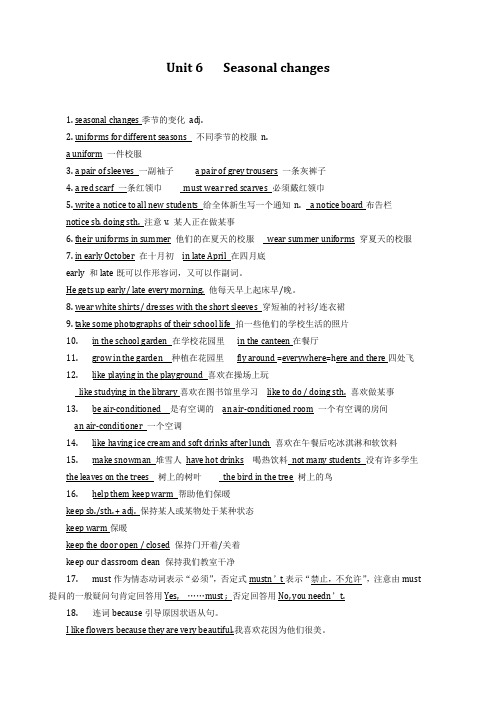
Unit 6 Seasonal changes1. seasonal changes季节的变化adj.2. uniforms for different seasons 不同季节的校服n.a uniform 一件校服3. a pair of sleeves 一副袖子 a pair of grey trousers 一条灰裤子4. a red scarf 一条红领巾must wear red scarves 必须戴红领巾5. write a notice to all new students 给全体新生写一个通知n. a notice board布告栏notice sb. doing sth. 注意v. 某人正在做某事6. their uniforms in summer 他们的在夏天的校服wear summer uniforms 穿夏天的校服7. in early October 在十月初in late April 在四月底early 和late既可以作形容词,又可以作副词。
He gets up early/ late every morning. 他每天早上起床早/晚。
8. wear white shirts/ dresses with the short sleeves 穿短袖的衬衫/连衣裙9. take some photographs of their school life 拍一些他们的学校生活的照片10. in the school garden 在学校花园里in the canteen在餐厅11. grow in the garden 种植在花园里fly around =everywhere=here and there四处飞12. like playing in the playground 喜欢在操场上玩like studying in the library喜欢在图书馆里学习like to do / doing sth. 喜欢做某事13. be air-conditioned 是有空调的an air-conditioned room 一个有空调的房间an air-conditioner 一个空调14. like having ice cream and soft drinks after lunch 喜欢在午餐后吃冰淇淋和软饮料15. make snowman 堆雪人have hot drinks 喝热饮料not many students 没有许多学生the leaves on the trees 树上的树叶the bird in the tree 树上的鸟16. help them keep warm 帮助他们保暖keep sb./sth. + adj. 保持某人或某物处于某种状态keep warm保暖keep the door open / closed 保持门开着/关着keep our classroom clean 保持我们教室干净17. must作为情态动词表示“必须”,否定式mustn’t表示“禁止,不允许”,注意由must 提问的一般疑问句肯定回答用Yes, ……must ; 否定回答用No, you needn’t.18. 连词because引导原因状语从句。
上海牛津英语六年级第二学期笔记U6笔记
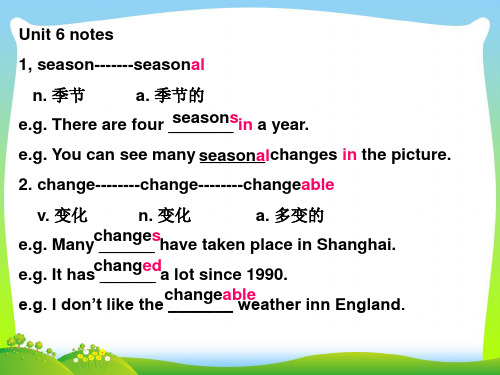
6, in late April, in early April, in middle April
在四月下旬 在四月上旬
在四月中旬
7. Must 必须
(1) Must I finish my homework?
------- Yes, you must. /I’m afraid you must.
-------No, you needn’t.
(2)He can’t be at home. I saw him in the library just now. 不可能
----He must be in the library. 肯定是
e.g. It hasc_h_a_n_g_e_da lot since 1990.
e.g. I don’t like thec_h_a_n_g_e_a_bwleeather inn England.
3, sleeve--------sleeves e.g. I will take the shirt with the short ________. 4, a pair of shorts/trousers/socks/glasses e.g. The trousers _a_re____ expensive. e.g. There __is___ a pair of trousers. 5. Wear身着。。 , put on 穿上。。。 e.g. Mr. Smith _w_e_a_r_s__ a red jacket today. e.g.P_u_t_o__n__ your coat! It’s cold outside. @@@wear a jacket/shirt/skirt/cap/hat
六年级下册英语教案-Unit6PElessons教案练习知识点梳理沪教牛津版.
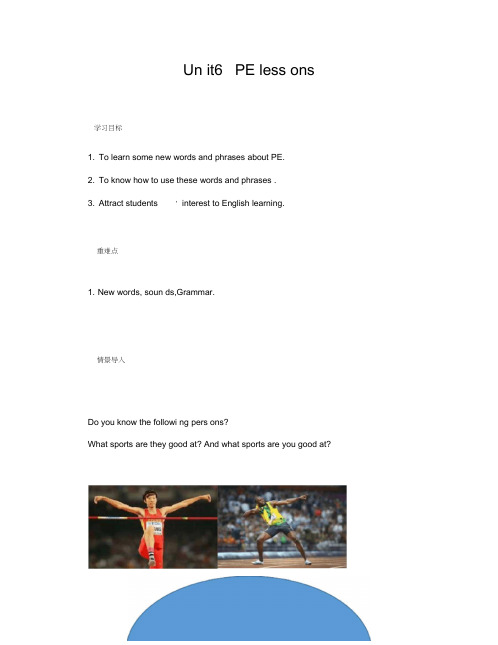
Un it6 PE less ons学习目标1. To learn some new words and phrases about PE.2. To know how to use these words and phrases .3. Attract students ' interest to English learning.重难点1. New words, soun ds,Grammar.情景导入Do you know the followi ng pers ons?What sports are they good at? And what sports are you good at?知识梳理、必记重点单词三、重点句型1. We run long races and shot races.2. We do the long jump and the high jump.3. My frie nds and I like play ing sport.1. We have two PE lessons at school every week. have (三单形式:has;过去式:had)【即学即练】1. 中译英。
我们经常在学校吃午饭。
解析:1. We often have lunch at school.2. My frie nds and I like PE less ons very much.1. ________ like playing football.A. I and JackB. Jack and IC. Jack2. My friends and like Chinese lessons ______ .A. very wellB. muchC. very much 解析:1. B 2. C3. We all want to win.⑴辨析all和both⑵ want【即学即练】1. My classmates are _______ 12 years old.A. allB. tooC. both2. Do you want _______ shopping with me tomorrow?A. goB. goingC. to go解析:1. A 2. C4. Jill is good at the high jump.is good at【即学即练】1. Mon keys are good at _______ .A. climbB. swimmi ngC. climbi ng 解析:C5. The races are excit ing.辨析exciting 和excitedThe movie, Aquaman, is very exciting.excited “激动的” The little girl is very excited because she 修饰人won the game.这个小女孩很激动因为她赢了游戏。
Unit 6 第3课时 课文讲解及语法拓展-六年级英语下册(牛津上海版)
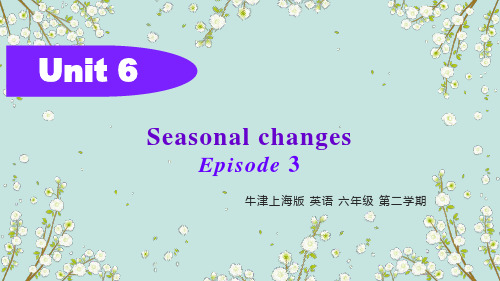
s
s
w
s
w
s
w
C
Look and learn
There is an air-conditioner in the school library.
The school library is air-conditioned.
//
C
4-1
1
2
3
4
Look and complete
Many __________ grow in the garden. Many __________ and __________ fly around.
What do many students like doing in summer?
S2:
Many students liktudents like ...?
S2:
Because ...
Think, draw and write
C
My school life in summer
In the school garden
In the playground
C
1
2
3
3-3
3
4
Many students like studying in the library. It is air-conditioned.
Many students like having ice cream and soft drinks after lunch.
In the library
In the canteen
C
Retell the school life in summer by using the following notes.Garden: many flowers/ grow/bees and butterflies/flyPlayground: not many students/playLibrary: many students/ studyCanteen: many students/ have
牛津小学六年级英语下册第六单元讲义
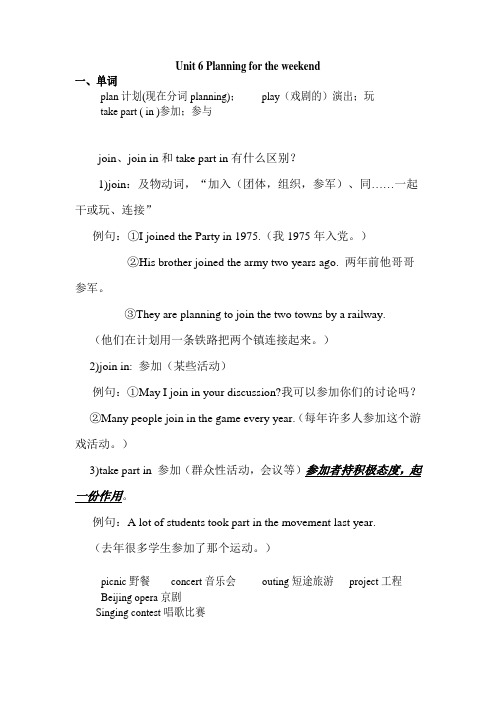
Unit 6 Planning for the weekend一、单词plan计划(现在分词planning);play(戏剧的)演出;玩take part ( in )参加;参与join、join in和take part in 有什么区别?1)join:及物动词,“加入(团体,组织,参军)、同……一起干或玩、连接”例句:①I joined the Party in 1975.(我1975年入党。
)②His brother joined the army two years ago. 两年前他哥哥参军。
③They are planning to join the two towns by a railway.(他们在计划用一条铁路把两个镇连接起来。
)2)join in: 参加(某些活动)例句:①May I join in your discussion?我可以参加你们的讨论吗?②Many people join in the game every year.(每年许多人参加这个游戏活动。
)3)take part in 参加(群众性活动,会议等)参加者持积极态度,起一份作用。
例句:A lot of students took part in the movement last year.(去年很多学生参加了那个运动。
)picnic野餐concert音乐会outing短途旅游project工程Beijing opera京剧Singing contest唱歌比赛二、词组:1. have school上课;有课The children do not have school today.2.have a picnic野餐3. I‟d love to 我很愿意…4.go on an outing去远足5. by the way顺便地;附带说说6.see a play看戏剧演出7. see a Beijing opera show看京剧演出8.of course当然9. warm and sunny温暖晴朗10.give a concert举行音乐会11. take part in the sports meeting参加运动会12. call sb. 打电给…13.join us参加我们14. talk about their plans for the weekend谈论他们的周末计划15. still in bed还在床上st year去年17.meet at one thirty in front of the Garden Theatre 一点半在花园剧院门前会面e with sb. 和Sb.一起来19.at the concert在音乐会上20.meet at the bus stop at 10:30 10:30在公交车站会面21.a new zebra from Africa 来自非洲的新斑马22. go out an outing外出旅行三、句型:1. 一般将来时be going to (表示“打算、将要、准备去做某事”)询问“某人打算干什么”及其应答:----What are we/you going to do?----We‟re/I‟m going to+动词原形/地点+时间(例如:---What are you going to do at 10:15 tomorrow morning?----I‟m going to…)----What is he/she/Liu Tao going to do?----He/She is going to…----What are Liu Tao and Tom going to do?----They are going to…其它特殊疑问句:----Where are you going? ----I‟m going to Hongmei Park.----What time are you going to come home? ----At 4:30, I think.----When are they going to meet?----They‟re going to meet at 1:30.Will与be going to区别:I‟m going to visit the History Museum. / I will visit the History Museum. be going to与will两者都表示将要发生的事、将要去做某事有如下几点差别:1. be going to 表示近期、眼下就要发生的事情,will 表示的将来时间则较远一些,如:He is going to write a letter tonight. He will write a book one day.2. be going to表示根据主观判断将来绝对发生的事情,will表示客观上将来势必发生的事情。
- 1、下载文档前请自行甄别文档内容的完整性,平台不提供额外的编辑、内容补充、找答案等附加服务。
- 2、"仅部分预览"的文档,不可在线预览部分如存在完整性等问题,可反馈申请退款(可完整预览的文档不适用该条件!)。
- 3、如文档侵犯您的权益,请联系客服反馈,我们会尽快为您处理(人工客服工作时间:9:00-18:30)。
六年级第二学期牛津英语知识点梳理
6B Unit 6 Seasonal changes
I. 补充词组
1.in spring/summer/autumn/winter 在春/夏/秋/冬
2.wear summer/winter uniforms 穿夏季/冬季校服
3. a school uniform 一件/套校服
4.in January 在一月(二月—十二月)
February/March/April/May/June/July/August/September/October/Novembe r/December
5.in early April 在四月初(上旬)
6.in late October 在十月末(下旬)
7.wear a red scarf 戴红领巾
8. a pair of socks/shoes 一双袜子/一双鞋子
9. a pair of glasses/trousers 一副眼镜/一条长裤
10.take some photographs of their school life 拍一些有关于他们的学校
生活的照片
11.an air-conditioner 一台空调
12.study in the air-conditioned library 在有空调的图书馆里学习
= study in the library with air-conditioners
13.before/after breakfast/ lunch/dinner 在早餐/午餐/晚餐之前/后
14.not many flowers/leaves 不多的花/叶
15.on the tree(s) 长在树上
16.in the tree(s) 在树上
17.help students keep warm 帮助学生保暖
18.help sb. (to) do sth. 帮助某人做某事
19.keep warm/clean/quiet 保持温暖/干净/安静
20.make a snowman 堆雪人
II.词性转换
1. season (n.) 季节→seasonal (adj.) 季节的
e.g. There are four seasons in a year.
Strawberries are seasonal fruit.
2. change (n.) 变化;找零/(v.) 改变;更换→changeable (adj.) 易变的,变化无常的
e.g. There are more and more changes in our country.
Here is your change, sir.
Please change the sentence into English.
The weather is very changeable in Tibet(西藏).
3. different (adj.) 不同的;有差异的→difference (n.) 不同;差异
e.g. Students like to wear different T-shirts in summer.
Can you tell me the differences between the two pictures?
4. short (adj.) 短的;矮的→shorts (n.) 短裤
e.g. In summer, the days are long and the nights are short.
Boys must wear T-shirts and shorts in summer.
5. life (n.) 生命(可数);生活(不可数) →lives (pl.) 生命(复数) →live (v.) 生活;居住
e.g. Jack saved Rose’s life, but he lost his.
He spends very little money in his daily life.
The farmer and his wife live happily in their hut and they enjoy their happy life very much.
6. condition (n.) 状况;条件→air-conditioner (n.) 空调→air-conditioned (adj.) 有空调的
e.g. The piano was still in good condition.
The library isn’t air-conditioned now because there is something wrong with the air-conditioner.
III. 语言点/句型
1. Miss Guo is writing a notice to all new students about their uniforms in
summer. 郭老师正在
给全体新生写一则有关夏季校服的通知。
write a notice to sb. 给某人写一则通知,此处notice是名词,意为“通知”。
notice是兼类词,也可以做动词,意为“注意”。
e.g. Sorry, I didn’t notice you.
2. All students must wear summer uniforms in September, early October, late
April, May and
June. 全体学生在九月、十月初、四月末、五月和六月必须穿夏季校服。
early +月份,表示“某个月份的月初/上旬”。
e.g. early April
late +月份,表示“某个月份的月末/下旬”。
e.g. late November
early/late是兼类词,既可以做形容词,也可以做副词。
e.g. get up early, come back late
3. Boys must wear white shirts with short sleeves. 男生必须穿白色短袖衬衫。
with是介词,意为“带着,具有”。
e.g. Girls must wear white blouses with long sleeves.
4. Peter and Kitty have taken some photographs of their school life in summer. 彼得和基蒂已经拍了一些有关他们的学校生活的照片。
此处life意为“生活”,是不可数名词。
e.g. Health is very important in our daily life.
life也可以意为“生活方式”,是可数名词。
e.g. He lives a happy life in the countryside.
5. Many flowers grow in the garden. 许多花朵生长在花园里。
此处grow是不及物动词,意为“生长;成长”。
e.g. The young trees grow well in the park.
grow也可做及物动词,意为“种植”。
e.g. He often grows some flowers in spring.
grow还可以做系动词,意为“逐渐变得”。
e.g. She is growing healthy.
6. Not many students like playing in the playground because it’s hot. 不多的学生喜欢在操场上玩耍,因为天气太热。
not many, not much意为“并非很多”,修饰主语,后跟可数/不可数名词。
e.g. Not many people want to do farming work now.
Not much time is needed to do it.
because是连词,引导原因状语从句。
e.g. John didn’t attend the meeting because he was ill yesterday.
7. Not many leaves grow on the trees. 不多的树叶长在树上。
on the tree(s) 意为“长在树上”,指原生的花、叶、果等。
e.g. Apples grow on the trees.
in the tree(s) 意为“在树上”,指外来的鸟、虫等。
e.g. Birds are singing in the trees.
8. What can you see in the garden? We can see many bees and butterflies flying around. 你们能在花园里看见什么?我们能看见许多蜜蜂和蝴蝶在到处飞。
see sb./sth. doing sth. 意为“看见某人/某物正在做某事”,强调动作正在发生且未结束。
e.g. I see many people swimming in the sea in summer.
see sb./sth. do sth. 意为“看见某人做某事”,强调动作的全过程已经结束。
e.g. We saw him play football this morning.。
